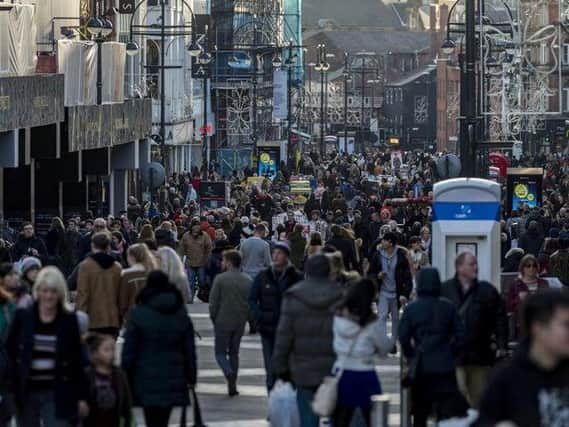Financial recovery from Covid-19 pandemic will be a postcode lottery for many people, experts predict


The findings by economic experts at the University of Sheffield come a day after GCSE results showed the region is also falling behind London and the South in attainment, with Yorkshire and the Humber having the lowest percentage of students receiving top marks.
Across England, 28.5 per cent of all GCSE entries scored at least a grade seven (roughly an A) or above but in Yorkshire and the Humber that figure was 24.4 per cent and the overall pass rate was the lowest in the region at 73.5 per cent, compared to 79.7 per cent in London and 76.9 across England.
Advertisement
Hide AdAdvertisement
Hide AdThe disparities were seized upon by Labour leader Sir Keir Starmer, who said yesterday: “For Gavin Williamson and the Government, on the issue of tackling inequality they just got a U and I think that’s completely unacceptable.”
The University of Sheffield report, which looks at the effects on communities and local economies in the wake of the pandemic, says the area a person lives in and what they do for work will greatly affect how quickly they are able to recover from the pandemic, with evidence of significant inequalities even within local authorities.
It highlights areas in South Yorkshire as being at high risk of economic hardship post-pandemic, including Rotherham Central, Central Doncaster, Masbrough and Bradgate in Rotherham and Batemoor and Jordanthorpe in Sheffield.
For small and medium-sized businesses, increases in debt and rent backlogs combined with consumers moving to buying online were all contributing to higher risks of poor recovery.
Advertisement
Hide AdAdvertisement
Hide AdThe Sheffield experts have created the Covid-19 Places Economic Recovery Index dashboard to help local authorities collect data about their neighbours and identify areas with a high recovery risk.
Co-author Dr Jesse Matheson said: “The lockdown during the pandemic was meant to pause then restart our economy. But within local authority areas we can see households and businesses have been affected differently by the pandemic. So far, policy has overlooked this variation in impact, running the risk of failing to identify those at risk of hardship and tailor appropriate support when the final public health restrictions are lifted.
“With the Government announcing an end to the extra £20 a month for Universal Credit claimants in October, those who have had to fall back on this financial support during lockdown may struggle to recover as quickly as more affluent communities.”
Sheffield’s former Chamber of Commerce president warned that the crisis will further the demise of the high streets as businesses will begin to be hit by rent backlogs and interest rates, while the furlough scheme will come to an end next month.
Advertisement
Hide AdAdvertisement
Hide AdFinancial planner Jill Thomas said she was seeing things she had “never seen before” as people and business owners in Sheffield faced crisis, adding that some were even drawing from pension funds to avoid being hard hit.
“A lot of businesses aren’t going to be able to afford the back rent and the potential interest on that as landlords queue up to get it after so many months,” she said.
Coun Chris Read, leader of Rotherham Council, said: “Over a decade of punishing austerity which has hit the poorest communities the hardest, alongside the growth of insecure jobs and a chronic lack of investment in areas like Rotherham, have created an environment where residents face insecurity and that inevitably reflects into local economies.
“On Monday, the council’s cabinet will consider the first phase in our Covid recovery plan, which will invest £5m in tackling some of the immediate crises we are facing over the next seven months. We know these measures alone will not be enough to tackle the endemic inequality in life chances faced by thousands in our communities.”